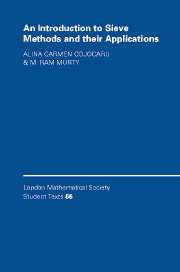Book contents
11 - New directions in sieve theory
Published online by Cambridge University Press: 23 November 2009
Summary
Nearly a century after the discovery of Brun's sieve, we can look back and see how the subject has developed, and, to some extent, indicate how it may develop in the next 100 years.
One of the dominant themes of the twentieth century number theory has been the ‘modular connection’. In 1955, Yutaka Taniyama (1927–58) first hinted at a connection between elliptic curves and automorphic forms. The Langlands program has absorbed this theme and the connection is expected to hold in a wider context. At the heart of the Langlands program lies the ‘Rankin–Selberg method’, which signals an ‘orthogonality principle’ for automorphic representations on GL(n). This point of view has suggested one mode of generalizing the large sieve inequalities of analytic number theory.
In a series of remarkable papers, H. Iwaniec and his school have developed the ‘modular connection’ and the cognate ‘spectral connection’ as it applies to GL(2) analogues of the large sieve inequality (see, for example,).
In this chapter, we give a brief overview of the work of Duke and Kowalski that suggests a future direction for the large sieve method. No doubt, there will be other directions of development, but the authors do not have a crystal ball to perceive them.
A duality principle
The large sieve inequality can be reduced to a statement in linear algebra, which in turn can be proven using matrix theory.
Information
- Type
- Chapter
- Information
- An Introduction to Sieve Methods and Their Applications , pp. 201 - 217Publisher: Cambridge University PressPrint publication year: 2005
